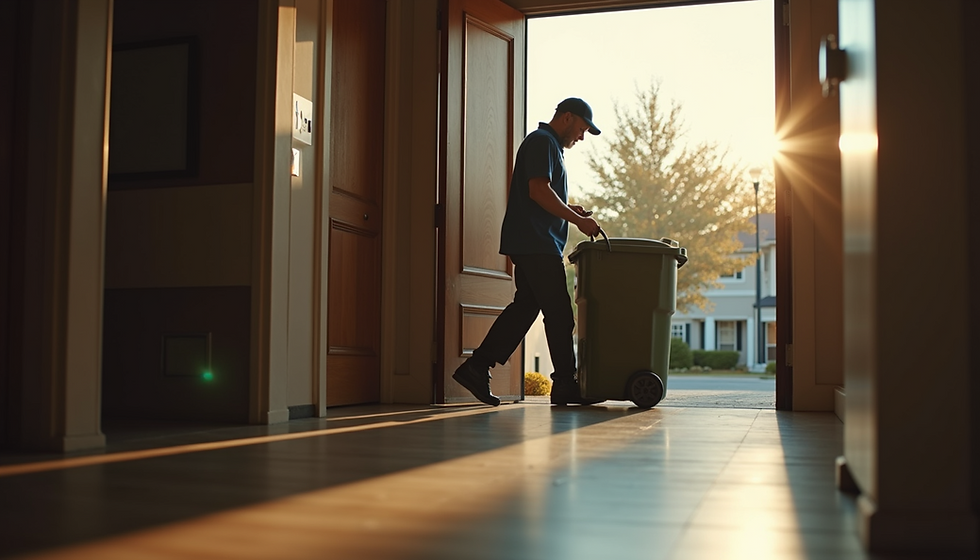Master Residential Waste Management for a Cleaner Home
- erbykaron
- Oct 20, 2025
- 4 min read
Keeping your living space clean and organized starts with managing waste effectively. Whether you live in a townhouse, condominium, senior home, or multi-family community, mastering home waste solutions can make a big difference. I want to share practical tips and insights that will help you handle your trash and recycling with ease and confidence.
Why Home Waste Solutions Matter
Managing waste properly is more than just taking out the trash. It’s about creating a healthier, safer, and more pleasant environment for everyone around you. When waste is handled well, it reduces odors, pests, and clutter. It also helps protect the environment by encouraging recycling and reducing landfill waste.
Here are some simple reasons why investing time in home waste solutions is worth it:
Improves hygiene: Proper disposal prevents bacteria and mold growth.
Enhances curb appeal: Clean surroundings make your home look inviting.
Supports sustainability: Sorting recyclables helps conserve resources.
Saves time and effort: Organized waste systems make trash day easier.
By focusing on these benefits, you can see how a little effort goes a long way in maintaining a clean home.

Practical Home Waste Solutions You Can Start Today
Getting started with better waste management doesn’t have to be complicated. Here are some straightforward steps you can take right now:
1. Set Up a Sorting Station
Create a designated area in your kitchen or garage for sorting recyclables, compost, and trash. Use clearly labeled bins to make it easy for everyone in your household to participate.
Use color-coded bins: Blue for recyclables, green for compost, black for trash.
Keep the station accessible but out of the way.
Educate family members on what goes where.
2. Reduce Waste at the Source
Think about what you bring into your home. Choose products with minimal packaging or packaging that can be recycled. Avoid single-use plastics when possible.
Buy in bulk to reduce packaging waste.
Use reusable bags, containers, and water bottles.
Plan meals to avoid food waste.
3. Schedule Regular Trash Pickup
Make sure your trash and recycling are collected regularly to avoid overflow. If your community offers valet trash services, consider signing up for convenience and reliability.
Check your local pickup schedule.
Use residential waste management services for hassle-free collection.
Keep bins clean to prevent odors and pests.
4. Compost Organic Waste
If you have space, start a compost bin for food scraps and yard waste. Composting reduces landfill waste and provides nutrient-rich soil for your garden.
Use a covered bin to keep pests away.
Add a mix of green (food scraps) and brown (leaves, paper) materials.
Turn the compost regularly to speed decomposition.
5. Dispose of Hazardous Waste Properly
Items like batteries, paint, and electronics require special handling. Find local hazardous waste collection events or drop-off centers.
Never put hazardous waste in regular trash.
Store hazardous items safely until disposal.
Check your city’s website for disposal guidelines.

What Items Are Not Picked Up?
Knowing what your waste service will not collect is crucial to avoid fines and frustration. Here’s a list of common items that are typically excluded from regular trash pickup:
Large appliances: Refrigerators, washers, dryers usually require special pickup.
Construction debris: Lumber, drywall, bricks, and other building materials.
Hazardous materials: Paint, chemicals, batteries, and electronics.
Yard waste: Branches, leaves, and grass clippings may need separate disposal.
Medical waste: Needles, sharps, and pharmaceuticals.
If you’re unsure about an item, contact your waste service provider for clarification. Many communities offer special collection days or drop-off sites for these materials.
Tips for Handling Non-Pickup Items
Schedule bulk item pickups if available.
Donate usable appliances or furniture.
Use certified e-waste recyclers for electronics.
Follow local guidelines for yard waste composting or disposal.
Understanding these restrictions helps you plan better and keeps your home waste solutions running smoothly.

How to Make Waste Management Effortless
The key to successful waste management is consistency and convenience. Here are some ways to make the process easier for you and your household:
Use valet trash services: These services pick up your trash right from your doorstep, saving you trips to the curb.
Set reminders: Use phone alerts for trash and recycling days.
Keep supplies handy: Stock up on trash bags, recycling bins, and cleaning products.
Involve everyone: Make waste sorting a family routine.
Stay informed: Keep up with local waste regulations and services.
By integrating these habits, waste management becomes a natural part of your daily routine rather than a chore.
Embracing Sustainable Waste Practices
Sustainability is a big part of modern home waste solutions. By reducing, reusing, and recycling, you contribute to a healthier planet. Here are some ideas to embrace sustainability at home:
Repurpose items: Turn jars into storage containers or old clothes into cleaning rags.
Donate instead of discard: Give away items in good condition to charities.
Buy eco-friendly products: Choose biodegradable or recyclable packaging.
Educate yourself and others: Share tips on waste reduction with neighbors.
Every small action adds up. Together, these efforts help reduce the environmental impact of household waste.
Mastering residential waste management is easier than you think. With a few simple changes and the right support, you can keep your home clean, safe, and environmentally friendly. If you want to make waste disposal even more effortless, consider professional services like residential waste management that handle everything for you. Clean living starts with smart waste solutions!




Comments